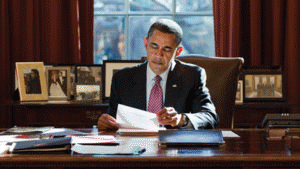From Consortium News
In the wake of Donald Trump's victory, a hot new issue -- raised by President Obama in an international setting on Thursday and touted on The New York Times' front page on Friday -- is the problem of "fake news" being disseminated on the Internet.
Major Internet companies, such as Google and Facebook, are being urged to censor such articles and to punish alleged violators. Also, teams of supposedly "responsible" news providers and technology giants are being assembled to police this alleged problem and decide what is true and what is not.
But therein lies the more serious problem: who gets to decide what is real and what is not real? And -- in an age when all sides propagate propaganda -- when does conformity in support of a mainstream "truth" become censorship of reasonable skepticism?
As a journalist for more than four decades, I take seriously the profession's responsibility to verify information as much as possible before publishing it -- and as editor of Consortiumnews.com, I insist that our writers (and to the extent possible, outside commenters) back up what they say.
I personally hate "conspiracy theories" in which people speculate about a topic without real evidence and often in defiance of actual evidence. I believe in traditional journalistic standards of cross-checking data and applying common sense.
So, I am surely no fan of Internet hoaxes and baseless accusations. Yet, I also recognize that mainstream U.S. news outlets have made horrendous and wholesale factual errors, too, such as reporting in 2002-03 that Iraq had reconstituted its nuclear weapons program (The New York Times) and was hiding stockpiles of WMD (many TV and print outlets, including The Washington Post).
And, mainstream outlets getting such life-and-death stories wrong was not just a one-off affair around the Iraq invasion. At least since the 1980s, The New York Times has misreported or glossed over many international issues that put the United States and its allies in a negative light.
For instance, the Times not only missed the Nicaraguan Contra cocaine scandal, but actively covered up the Reagan administration's role in the wrongdoing through the 1980s and much of the 1990s.
The Times lagged badly, too, on investigating the secret operations that became known as the Iran-Contra Affair. The Times' gullibility in the face of official denials was an obstacle for those of us digging into that constitutional crisis and other abuses by the Reagan administration. [For more on this topic, see Consortiumnews.com's "New York Times: Apologist for Power."]
In that same era, The Washington Post performed no better. Leonard Downie, its executive editor at the time of the Contra-cocaine scandal, has continued to reject the reality of Ronald Reagan's beloved Contras trafficking in cocaine despite the 1998 findings of CIA Inspector General Frederick Hitz that, in fact, many Contras were neck-deep in the cocaine trade and the Reagan administration covered up their criminality for geopolitical reasons.
More recently, during the mad dash to invade Iraq in 2002-03, the Post's editorial-page editor Fred Hiatt wrote repeatedly as flat fact that Iraq was hiding WMD and mocked the few dissenting voices that challenged the "group think."
Yet, Hiatt suffered no accountability for his falsehoods and is still the Post's editorial-page editor, still peddling dubious examples of Washington's conventional wisdom.
Ministry of Truth
So, who are the "responsible" journalists who should be anointed to regulate what the world's public gets to see and hear? For that Orwellian task, a kind of Ministry of Truth has been set up by Google, called the First Draft Coalition, which touts itself as a collection of 30 major news and technology companies, including the Times and Post, tackling "fake news" and creating a platform to decide which stories are questionable and which ones aren't.
(Note: You can view every article as one long page if you sign up as an Advocate Member, or higher).






